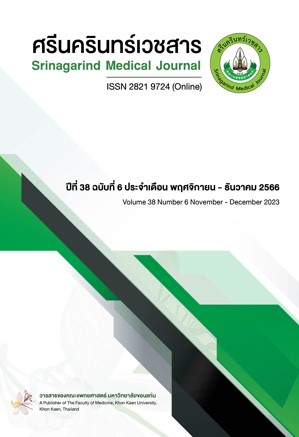Development of Medication Reconciliation Model to Reduce Medication Errors with Information Technology Systems at Ward of Medicine, Roi Et Hospital
Keywords:
medication errors, information technology systems, chronic diseaseAbstract
Background and Objective: Giving medicine to a patient with a medication error is high risk and could cause severe harm to the patient. This study aimed to develop medication reconciliation (MR) model to reduce medication errors by using information technology systems at Medical ward, Roi Et Hospital.
Methods: This study was participatory action research. The research was divided into 4 phases; 1) analysis of the current situation and problems, 2) MR process development, 3) implementation of the MR process, and 4) evaluation of the performance. Data were collected from 563 patients, before development 268 cases and after development 295 cases. The medication lists coordinated 633 times in patients with chronic diseases admitted during November 2022 to October 2023. Descriptive statistics were used for all data analyzed.
Results: The MR model was developed consists of 9 steps; 1) check every admitted patient, 2) Retrieve history data of patients with chronic disease that take medication for the past 180 days to medication review, 3) The doctor consider to order same medication list, 4) The nurse scans the order form as “new case”, 5) The pharmacy staff collected the original medication history and typed it into MR program, 6) The pharmacist checking the original medication list from the pharmacy staff, 7) In the case of patient moved to new wards, the doctor has to treatment reviews, 8) When discharged patient, pharmacist who dispensing medicine always check and compare with original medicine list. If has problem consults doctor, 9) the pharmacist attached list of medicines of patient with chronic diseases when discharged. After development MR was found 66 times, 4.55 % corrected, and 95.45% prevented. The most common MR was 44.16% did not receive the medicine that they should receive. The severity of MR that not found severity and dangerous to death. The cost of medicines was saved from MR process increased from 17,920.34 baht to 42,967.45 baht.
Conclusion: The MR development process by using information technology that has 9 steps for work. These processes increase the speed of work and make patients safety. It can reduce MR and also save cost of medicine.
References
Home | Institute For Safe Medication Practices [Internet]. 2023 [cited Oct 18, 2023]. Available from: https://www.ismp.org/
Bates DW, Cullen DJ, Laird N, Petersen LA, Small SD, Servi D, et al. Incidence of adverse drug events and potential adverse drug events. Implications for prevention. ADE Prevention Study Group. JAMA 1995;274(1):29–34. doi: 10.1001/jama.274.1.29
Catalano K. JCAHO’S National Patient Safety Goals 2006. J Perianesth Nurs 2006;21(1):6–11. doi: 10.1016/j.jopan.2005.11.005
JCAHO’s 2006 National Patient Safety Goals: handoffs are biggest challenge. Hosp Peer Rev 2005;30(7):89–93.
Ningsanon T. Medication reconciliation. In: Ningsa non T, Montakantikul P, Chulavatnatol S, editors. Medication reconciliation. Bangkok: Prachachon; 2008:2-26.
National Patient Safety Goals | The Joint Commission [Internet]. [cited Oct 19, 2023]. Available from: https://www.jointcommission.org/standards/national-patient-safety-goals/
2023 National Patient Safety Goals | United Ad Label [Internet]. [cited Oct 19, 2023]. Available from: https://www.unitedadlabel.com/blog/post/5-steps-to-meeting-joint-commission-patient-safety-goals/
Chanatepaporn P.The study of preparing errors by pharmacy robot and various electronic drug cabinet in hospitalized patients at Srinagarind Hospital. IJPS 2020;16(3);39-51. doi: 10.14456/ijps.2020.16
Jitanapakarn P, Khunawaradisai N, Supapaan T. Outcomes of medication reconciliation at patient ward in a community hospital in the Northeast. Thai Journal of Pharmacy Practice 2023;15(4):1003–14.
Piriyachananusorn N, Chalortham N, Kitikannakorn N. Improvement and evaluation of medication reconciliation at orthopedic wards in a regional hospital. Thai Journal of Pharmacy Practice 2023;15(3):750–65.
Madbouch N, PattharachayakulS, Lerkiatbundit S. Effect of the utilization of pharmaceutical care tools developed to managepreventable adverse drug events in general surgical patients. Thai Journal of Pharmacy Practice 2018;10(2):494–504.
Bates DW, Boyle DL, Vander Vliet MB, Schneider J, Leape L. Relationship between medication errors and adverse drug events. J Gen Intern Med 1995;10(4):199–205. doi: 10.1007/BF02600255
Kunac DL, Kennedy J, Austin N, Reith D. Incidence, preventability, and impact of Adverse Drug Events (ADEs) and potential ADEs in hospitalized children in New Zealand: a prospective observational cohort study. Paediatr Drugs 2009;11(2):153–60. doi: 10.2165/00148581-200911020-00005
Riaz MK, Riaz M, Latif A. Review - Medication errors and strategies for their prevention. Pak J Pharm Sci 2017;30(3):921–8.
Radley DC, Wasserman MR, Olsho LE, Shoemaker SJ, Spranca MD, Bradshaw B. Reduction in medication errors in hospitals due to adoption of computerized provider order entry systems. J Am Med Inform Assoc 2013;20(3):470–6. doi: 10.1136/amiajnl-2012-001241
Vermeulen KM, van Doormaal JE, Zaal RJ, Mol PGM, Lenderink AW, Haaijer-Ruskamp FM, et al. Cost-effectiveness of an electronic medication ordering system (CPOE/CDSS) in hospitalized patients. Int J Med Inform 2014;83(8):572–80. doi: 10.1016/j.ijmedinf.2014.05.003
National Coordinating Council for Medication Error Reporting and Prevention | NCC MERP [Internet]. [cited Nov 20, 2023]. Available from: https://www.nccmerp.org/
Chanatepaporn P, Anutchatchaval S, Nakornratanachai P. Development of Medication Reconciliation at Female-Medicine Ward in Srinagarind Hospital. Srinagarind Med J 2014;29(3):276-82.
Chanatepaporn P. Development of prescribing error program for reporting in Srinagarind hospital. Srinagarind Med J 2019;34(3):261-70.
Lizer MH, Brackbill ML. Medication history reconciliation by pharmacists in an inpatient behavioral health unit. Am J Health Syst Pharm 2007;64(10):1087–91. doi: 10.2146/ajhp060323
Phromkhot C, Rattanamahattana M. Development and evaluation of a hospital medication reconcili- ation process: A case study for diabetic in – patient service at a mid - level general hospital in the north east region. IJPS 201722;13(3):49–58.
Mayachearw K, Wongpoowarak P. Effects of Medication Reconciliation Process at Surgical Wards in a Regional Hospita.Thai Journal of Pharmacy Practice 2016;8(1):35-47.
Uhlenhopp DJ, Aguilar O, Dai D, Ghosh A, Shaw M, Mitra C. Hospital-Wide Medication Reconciliation Program: Error Identification, Cost-Effectiveness, and Detecting High-Risk Individuals on Admission. Integr Pharm Res Pract 2020;9:195–203. doi:10.2147/IPRP.S269857
Downloads
Published
How to Cite
Issue
Section
License
Copyright (c) 2023 Srinagarind Medical Journal

This work is licensed under a Creative Commons Attribution-NonCommercial-NoDerivatives 4.0 International License.




